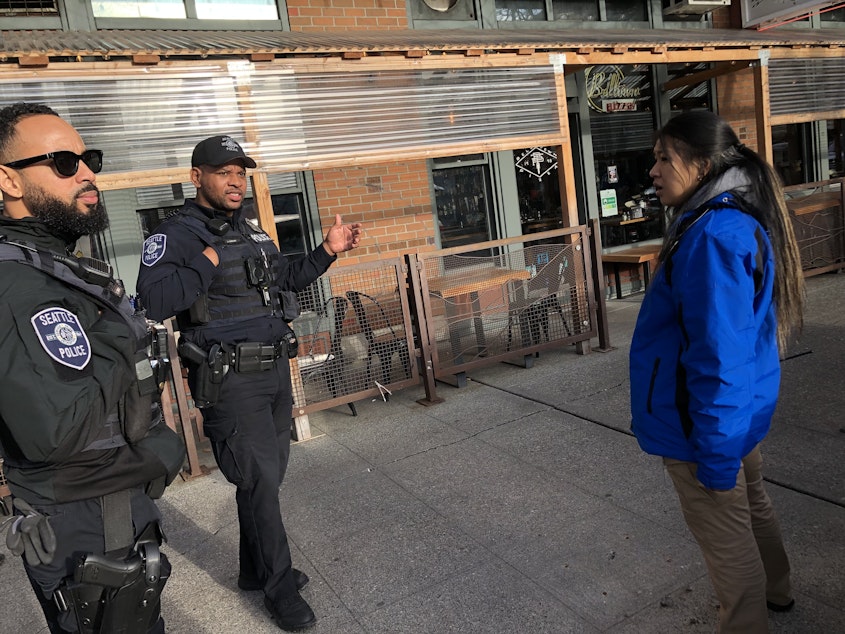Seattle's non-police first responders prepare to expand footprint

Seattle’s unarmed crisis responders are staffing up as they prepare to answer calls citywide by next spring. Additional job postings for 18 responders and three supervisors should be online in the coming days, officials say.
The expansion is funded by a $1.9 million grant from the U.S. Department of Justice.
Under a pilot program, Seattle 911 dispatchers have been sending a team from Seattle’s new department of Community Assisted Response and Engagement (CARE) to certain non-criminal calls alongside police downtown for almost a year.
RELATED: New mental health teams are hitting the streets in downtown Seattle alongside police
The calls for “person down” or welfare checks often involve helping people who are unsheltered, or dealing with mental health or substance use issues. Managers say about a third of the CARE team’s calls also involve transporting people to access necessary resources.
Catriana Hernandez is the community crisis response manager overseeing the CARE department. She said the existing team is already answering calls in the East and West precincts that cover the central swath of Seattle. Additional teams will expand first to north Seattle later this year, and then to south Seattle next spring.
Sponsored
The existing team is currently working out of the Seattle Municipal Tower, but Hernandez said the city is looking for appropriate spaces in six different sectors of the city.
“We really want the team to be able to respond quickly for one thing, and also just to consistently be out in the area — if you’re not out on a call — visiting community partners, getting to know resources,” Hernandez said.
“We’re also talking to potential community partners” including the University of Washington Police Department, she added, about providing space for the teams.
Under Seattle's pilot program, the existing CARE team can only respond to certain low-acuity 911 calls and cannot be directly dispatched without police.
RELATED: In Seattle area, 988 mental health hotline supports tens of thousands in crisis
Sponsored
Critics say the CARE teams should also be allowed to respond to a broader range of 911 calls and to work more independently. Hernandez said those conversations with the city are ongoing as well.
In the meantime, she said the CARE team is partnering with organizations to fill gaps in non-emergency situations. “We’re also finding that there are a lot of places that have some assistance or service they can give, but they’re tied to their location, right? The library is a good example,” Hernandez said. Seattle Public Library’s central library has “social services librarians” available to help people find the resources they need. But even if they track down available shelter, they can’t help people get there. Hernandez said the CARE team could fill that gap.
She said the city has also had conversations with American Medical Response about partnering to assist people in a mental health crisis, such as low-risk suicidal ideation, while those people are waiting for an ambulance to go to the hospital voluntarily.
“A lot of times we end up with repeat calls for those people because the wait time can be significant,” Hernandez said. People sometimes walk away or change their minds about seeking care.
RELATED: King County is getting its first walk-in mental health crisis center
Sponsored
Hernandez said the city is exploring the possibility of having the CARE team “go out and triage and build rapport to help bridge that gap, and keep them on scene for that response.”
An important asset that the CARE team can offer is the ability to refer people in behavioral crisis to one of 16 beds in the diversion facility at the city’s Crisis Solutions Center, which is meant to provide alternatives to jail and hospital settings.
Initially, Hernandez said, police were sometimes called back to the scene to assess people and make that referral, but CARE team members can now make that referral on their own.
"There’s basically a separate system for first responders where those requests are processed first and immediately," so that’s an important ability for the CARE team members to possess, she said.


